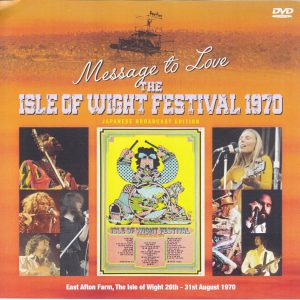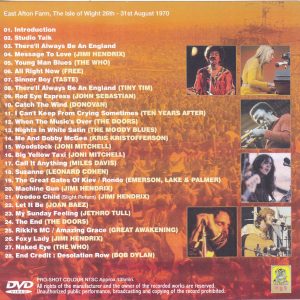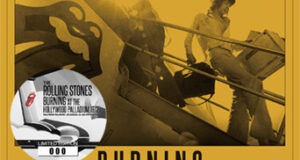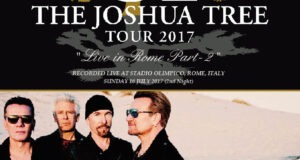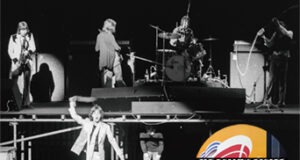Various Artists / Message To Love The Isle Of Wight Festival 1970 Japanese Broadcast Ediition / 1DVDR / Non Label
East Afton Farm, The Isle of Wight 26th – 31st August 1970
Click Image To Enlarge
The huge festival that remains in rock history, Isle of Wight Festival in 1970. The masterpiece movie approaching the truth is the gift and release decision.
The movie is “MESSAGE TO LOVE: THE ISLE OF RIGHT FESTIVAL 1970”. A documentary film released at the San Jose Film Festival in 1995, 25 years after the festival. After that, it was softened as “Wight Island 1970: Afterimage of Shining Rock”, but it is now out of print. However, this work is not that software version. Produced by Tsubaki Broadcasting Corporation in 1995, same as the film festival. It is a Japanese broadcast version with commentary commentary scenes and original Japanese subtitles. In our shop, we have archived many of the finest masters recorded by recording mania, but this film is its latest bullet. As evidenced by the previous works, you can see the super high quality using the high-end equipment of the time.
And to the commentary scene unique to the program. A nice and easy-to-understand commentary by a familiar British critic, and a number of celebrities comment on film highlights. But more interesting than that is the historical image. In order to introduce the 1970s that became the stage of the festival, various 60’s images are streamed. In addition to historical events such as Apollo 11 Lunar Landing, China-Cultural Revolution, and Rev. King’s assassination, anti-war movement, flower movement, psychedelic, and drug appeared. Since there is no sense of incongruity because it is overseas so far, Osaka, the World Expo, high growth, mini skirts, go-go cafes also appear. If you are looking at it for the first time, you might think, “Are you annoyed?” More than music, the key to a movie is the ‘1970’ era itself. It is a production that makes you feel the sense of the times in Japanese customs. Both the sense and the hugeness of the video materials are, indeed, the Tsubame Broadcasting Association. [Japanese subtitles unique to the program] And the movie main part that begins. This is basically the same as the original, but the program has its own Japanese telop. It is not only interviews and MCs, document scenes, but also introductions of characters such as “stage progress” Rickey “and” event promoter “Ray” “Ron” Japanese subtitles are attached to the carpenter “Bad”) and also to the lyrics of the performance.
The lyrics subtitles were not found on the official DVD, but this is very effective. If you have seen Paul McCartney’s “GET BACK” and ZEP’s “The Live of Fever” that you introduced the other day, I think it will come as a pin. . It captures the mood well, and delivers messages directly in short, easy-to-understand words.
Moreover, the effect is two or more of the above. As I will mention later, this festival is held over five days, and in the middle of that, the direction of the clouds changes rapidly. The performance scene inserted there also serves as a scene change. For example, after the audience talks about the drug, the drug song flows, or the song of love and peace becomes a contrast in the place where it was killed by trouble. By subtitles even to the lyrics, it is vividly understood that the performance scene has more meaning than just valuable recordings. [Fest that the 60’s and 70’s collided] The content of the film that is conveyed until then is overwhelming. The film is a series of interviews with audiences and the back side of the operation while sprinkling valuable performance scenes. If it is only that, it is a normal documentary, but the point of this movie is “music and business”. More specifically, it is a confrontation between the organizers and the audience.
This is very real and sharp. Usually, when it comes to “organizer vs spectator”, it is likely to empathize with the audience, but it is not so simple. At first the festival is peace itself. The organizer, Rickey, is also a love and a piece, announcing, “Once you go, I will miss drugs under the age of 17”. However, “everything ant” destroys the festival. People who don’t have tickets will also gather and push for free admission. Anger frustrated with the fence itself that restricts entrance, saying “It’s a psychedelic concentration camp” “You’re thinking only how much money you’re thinking”, the organizers will “pay for the ticket fee to enter” “Can’t pay the artist’s fee I complain.
Naturally, from our point of view, the organizer, Rickey, is saying something natural, but the age is 1970. Until recently, flower power was in full bloom, and half of the legendary Woodstock audience (200,000) had free admission. The square is for everyone, and people who believe that music is free were supporting rock. And the situation is complicated because both musicians and organizers are of the same generation. When announcing, “I don’t have enough cash to pay for the artist. If you don’t have tickets, please leave the hall.” · Anderson also “It’s good to break the fence. It’s a shame that we won’t appear if you don’t come out,” said MC. Organizer Rickey will also hand out tickets as a reward for the paint job, and debate on the stage with the angry audience.
The intense is the scene of Joni Mitchell. A man rushes into the stage and “I borrow a microphone. I have something I want to say a little.” The man is immediately picked up, but he says, “Commercial music is addicted to here. Joni also can not return to the performance immediately, and complains, “It’s about concentrating on this feeling of ignorance … respecting us.” And I sing “Big Yellow Taxi”, and the lyrics are made to think again.
“I smashed the paradise and made the parking lot I put the tree in the” tree museum ”
If you want to see the entrance fee 1 dollar 50 cent
Common story I can not notice important things until I lose them. ”
No matter what you think of it, although the spectators are unreasonable, was it about the paradise of the 60’s that was going to be lost?
Even so, the situation is getting worse. Organizer Rickey has complained that “If 170,000 people buy tickets, the balance will be tonton, then it will be a free concert. Please don’t call us a changer,” but the incoming crowd will be stopped for free. Absent. And the limit comes after “The End” of THE DOORS. Let’s spell the words that Ricky spoke.
“I hope we understand each other and have a good sense of separation after all. It’s definite that this festival will make a deficit. Let’s open up all the gates and get in and out freely. And let’s all enjoy music together. I These are literally no sentences, but to say the purpose of this event was not money, but from now on you may be annoyed with debt collectors, but it doesn’t matter. I’m satisfied with just sharing experiences I can not buy
Please have love and peace in the heart of your family. ”
The Isle of Wight Festival was the last of a man who burned his guitar in the 60’s with intense emotions, and was also the shocking debut of a prog band who will release a cannon in the 70’s. It was the time that was trying to replace “emotional expression” with “entertainment” and “freedom and chaos” with “order and business” at that site. While collecting 600,000 people, less than 1/10 of the tickets were paid and Isle of Wight collapsed. It feels strange to the audience who appeals for “free (free and free)”, and the current music industry collapsing by the Internet can not but be overlapped.
Not only are the performances terrifyingly great, but the phenomena that can only be found in 1970, when the 60s and 70s cross, are overwhelming. It is a Japanese broadcast that draws the essence of such a record movie sharply with its own subtitles. Please enjoy it carefully.
ロック史に残る巨大フェス、1970年のワイト島フェスティバル。その真実に迫る傑作映画がギフト・リリース決定です。
その映画とは『MESSAGE TO LOVE: THE ISLE OF WIGHT FESTIVAL 1970』。フェスの25年後となる1995年にサンノゼ映画祭で公開されたドキュメンタリー映画です。その後、『ワイト島1970:輝かしきロックの残像』としてソフト化されましたが、現在は廃盤ともなっています。ただし、本作はそのソフト版ではありません。映画祭と同じ1995年に某放送協会によって制作されたもの。評論家による解説シーンや独自の日本語字幕も付いた日本放送版なのです。当店では、記録マニアによって録画された極上マスターを数多くアーカイヴしてきましたが、本作はその最新弾。これまでの諸作で証明されている 通り、当時のハイエンド機材を駆使した超絶クオリティでご覧いただけます。
【フェスの実態が分かる解説コーナー】
番組は開始早々から強烈で、独自シーンの連発に目眩がする。いきなり「25年の時を越え 今、よみがえる」の文字がナナメに飛び、「ロック黄金伝説」のタイトルがグルグル回る。EL&Pの映像には「衝撃のデビュー!!」の文字が乗り、ジミヘンでは「ラスト・ステージ!」が燃えるテロップで紹介される。
そして、番組独自の解説シーンへ。お馴染みの英国人評論家による穏やかで分かりやすい解説が素晴らしく、数々の有名人が映画の見どころをコメントする。しかし、それ以上に面白いのが歴史映像。フェスの舞台となった1970年を紹介するため、さまざまな60年代映像が流されるのです。アポロ11号月面着陸、中国・文化大革命、キング牧師暗殺といった歴史的事件の他、反戦運動、フラワー・ムーブメント、サイケデリック、ドラッグも登場。ここまでは海外なので違和感はありませんが、さらに大阪・万国博、高度成長、ミニ・スカート、ゴーゴー喫茶まで出てくる。初めてご覧になる方は「ふざけてるの?」と思うかも知れませんが、実はそうではない。音楽以上に映画の要となっているのは「1970年」という時代そのもの。日本の風俗で時代感を実感させる演出なのです。そのセンスも、映像資料の膨大さも、さすが某放送協会です。
【番組独自の日本語字幕】
そして始まる映画本編。ここは基本的にオリジナル通りですが、番組独自の日本語テロップが入る。それもインタビューやMC、ドキュメント・シーンだけでなく、「ステージ進行“リッキー”」や「イベント・プロモーター”レイ”“ロン”」といった登場人物の紹介テロップ(わりとどうでもいい「海軍大佐」や「大工“バド”」まで)、さらには演奏の歌詞にも日本語字幕が付くのです。
歌詞字幕は公式DVDにもなかったものですが、これが非常に効果的。先日ご紹介したポール・マッカートニーの『GET BACK』やZEPの『狂熱のライヴ』をご覧になった方ならピンと来ると思いますが、某放送協会の対訳は独自のもので、センスが非常に良い。ムードをしっかりと捉えつつ、短く分かりやすい言葉でメッセージをダイレクトに伝えてくれるのです。
しかも、その効果は上記2作以上。後述しますが、このフェスは5日間に渡って開催され、その最中にどんどん雲行きが変わっていく。そこに挿入される演奏シーンは場面転換の役目もあるのです。例えば、観客がドラッグを語った後にドラッグソングが流れたり、トラブルで殺伐としたところに愛と平和の歌がコントラストになったり。歌詞にまで字幕が付くことで、演奏シーンが単に貴重な記録以上の意味を持っていることがビビッドに分かるのです。
【60年代と70年代がぶつかりあったフェス】
そこまでして伝える映画の中身こそが圧倒的。映画は貴重な演奏シーンを散りばめつつ、観客のインタビューや運営の裏側を描いていくというもの。それだけなら普通のドキュメンタリーですが、この映画のポイントは「音楽とビジネス」。もっと具体的に言うと主催者側と観客の対立なのです。
これが非常にリアルで鋭い。普通「主催者vs観客」となると観客側に感情移入しそうになりますが、そう簡単な話ではない。最初のうちはフェスは平和そのもの。主催者リッキーも「お巡りさんは17歳以下のドラッグは見逃してくれるってさ」とアナウンスするほどラヴ&ピースなのです。しかし、その“何でもアリ”がフェスを壊していく。チケットを持たない人たちも集まり、無料で入場させろと迫る。入場を制限するフェンス自体に怒り「サイケな強制収容所だ」「どうせ金儲けしか考えてないんだろ」と噛みつき、主催者側は「チケット代を払って入場しろ」「アーティストに出演料も払えなくなる」と訴えるのです。
当然、今の私たちから見れば主催者リッキーは当たり前の事を言っているのですが、時代は1970年。ついこの前までフラワー・パワーが咲き乱れ、伝説のウッドストックでは半分の観客(20万人)が無料で入場していた時代。広場はみんなのものであり、音楽は自由だと信じる人々がロックを支えていたわけです。そして、ミュージシャンも主催者側も同じ世代だから事態は複雑。「アーティストに支払う現金が足りません。チケットを持っていない人は会場から出ていってください」とアナウンスすると、ミュージシャンが「俺たちがカネをせびってゴネてるみたいに言うな」と怒り、イアン・アンダーソンも「フェンスを破るのもいいさ。君たちが出ていかなければ僕らが出演しないなんてデタラメだ」とMC。主催者リッキーもペンキ塗りの仕事の報酬としてチケットを配ったり、怒る観客とステージで討論したり(凄い……)と手段を講じるのです。
強烈のはジョニ・ミッチェルのシーン。ステージに男が乱入し、「マイクを借りるよ。少しばかり言いたいことがあってね」と演奏を妨害する。男はすぐつまみ出されますが、「商業音楽がここにも紛れ込んでる。俺がどんなに筋の通った男かステージで証明してやる」とまくし立てる。ジョニもすぐには演奏に戻れず、「こんな落着かない雰囲気の中で気持ちを集中するのは……私たちを尊重して」と訴える。そして、「Big Yellow Taxi」を歌うのですが、その歌詞がまた考えさせられるのです。
「楽園つぶして駐車場を作った 木を引っこ抜き“木の博物館”に入れた
見たいなら入場料1ドル50セント
よくある話 大切な物は失うまで気がつかない」
どこをどう考えても観客側が理不尽ではあるものの、失われようとしていたのは60年代の楽園だったのか、それとも……。
そうこうしている間も、状況は悪化の一途。主催者リッキーは「17万人がチケットを買えば収支がトントンになる。そうしたらフリー・コンサートにする。俺たちを守銭奴と呼ばないでくれ」と訴えるものの、無料で入ってくる群衆は止められない。そして、THE DOORSの「The End」の後に限界が来る。リッキーが語った言葉を綴っておきましょう。
「お互いに理解しあって後味のいい別れ方をしいたい。このフェスティバルが赤字を出すことは確定的だ。ゲートを全部あけて出入り自由にしよう。そしてみんな仲よく音楽を楽しもうじゃないか。俺たちはこれで文字どおり無一文だ。でも言っとくが、このイベントの目的はカネなんかじゃなかった。これから借金取りに悩まされるだろうけど、それはどうでもいい。こんなに大勢の人たちに集まってもらってカネでは買えない経験を共有できたことだけで満足だ
どうか愛と平和を胸に家路についてほしい」
60年代に激情の発露でギターを燃やした男の最後であり、70年代に大砲をぶっ放していくプログレ・バンドの衝撃デビューでもあったワイト島フェスティバル。その現場に渦巻いていたのは「感情表現」が「エンターテインメント」に、「自由・混沌」が「秩序・ビジネス」に取って代わろうとしていた時代そのものでした。60万人を集めながら、チケット代を払ったのは1/10も満たずにワイト島フェスは崩壊。「フリー(無料と自由)」を訴える観客に違和感を覚えつつ、ネットによって崩壊しつつある今の音楽業界もオーバーラップせずにはいられません。
数々の演奏が恐ろしいほどに素晴らしいだけでなく、60年代と70年代が交差した1970年にしかあり得ない「現象」こそが圧倒的。そんな記録映画の本質を独自字幕で鋭く描く日本放送です。どうぞ、じっくりとお楽しみください。
(134:50)
1. Introduction
2. Studio Talk
3. There’ll Always Be An England
4. Message to Love (Jimi Hendrix)
5. Young Man Blues (The Who)
6. All Right Now (Free)
7. Sinner Boy (Taste)
8. There’ll Always Be An England (Tiny Tim)
9. Red Eye Express (John Sebastian)
10. Catch The Wind (Donovan)
11. I Can’t Keep From Crying Sometimes (Ten Years After)
12. When The Music’s Over (The Doors)
13. Nights In White Satin (The Moody Blues)
14. Me And Bobby McGee (Kris Kristofferson)
15. Woodstock (Joni Mitchell)
16. Big Yellow Taxi (Joni Mitchell)
17. Call It Anything (Miles Davis)
18. Suzanne (Leonard Cohen)
19. The Great Gates Of Kiev / Rondo (Emerson, Lake & Palmer)
20. Machine Gun (Jimi Hendrix)
21. Voodoo Child (Slight Return) (Jimi Hendrix)
22. Let It Be (Joan Baez)
23. My Sunday Feeling (Jethro Tull)
24. The End (The Doors)
25. Rikki’s MC / Amazing Grace (Great Awakening)
26. Foxy Lady (Jimi Hendrix)
27. Naked Eye (The Who)
28. End Credit : Desolation Row (Bob Dylan)
PRO-SHOT COLOUR NTSC Approx.135min.
 GiGinJapan Artwork of Japanese CDs (mostly)
GiGinJapan Artwork of Japanese CDs (mostly) 